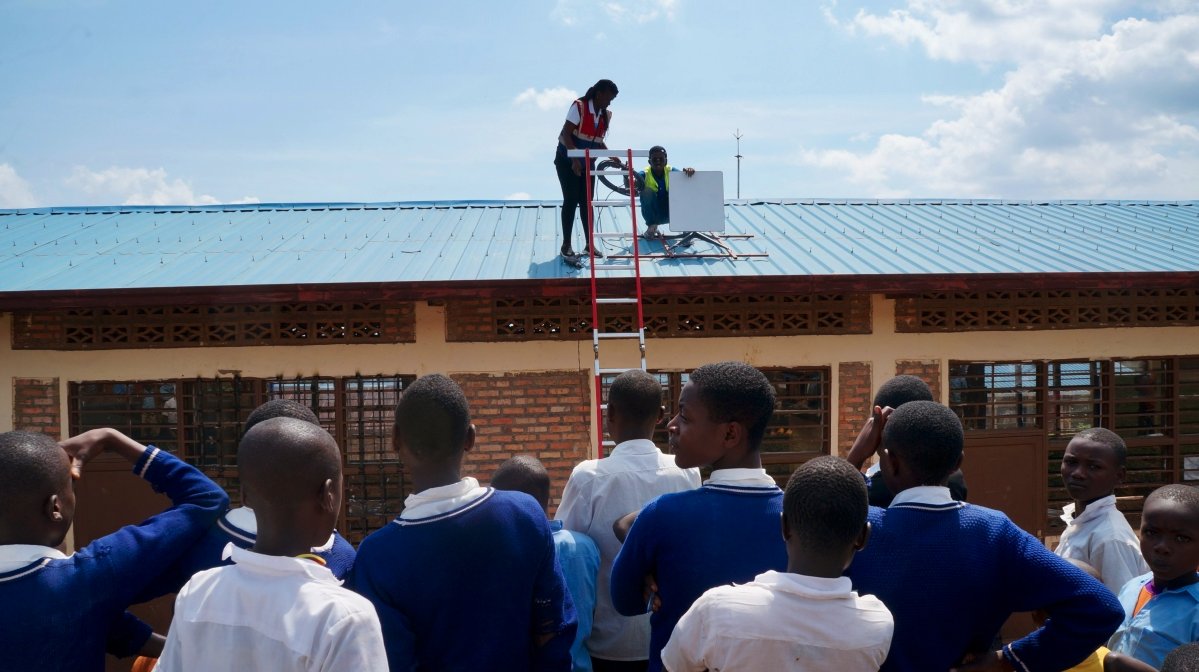Africa
Elon Musk’s Starlink Shakes Up Competition In Africa

Semafor: Starlink’s satellite internet rollout across Africa is sparking complaints of unfair competition from telecommunications companies and internet service providers that have invested hundreds of millions of dollars in building local networks.
In a leaked memo to Kenya’s communications regulator, the country’s largest telco Safaricom called for stricter regulations on satellite internet providers like Elon Musk-owned Starlink to level the playing field. Safaricom argued that satellite internet providers should be required to partner with local mobile network operators, rather than being granted independent licenses.
The telco, which is partly government owned, noted that these providers often operate without a physical presence in the country, relying on third parties and resellers to distribute their hardware, which makes it difficult for regulators to ensure accountability and compliance.
And it’s not just in Kenya. ISPs and telcos in Zimbabwe, Nigeria, and Cameroon have also raised concerns about Starlink’s free rein, lax regulatory requirements, and their inability to compete fairly with its services and pricing. These companies have thousands of employees across the region while Starlink has next to no local presence on the continent.
But the upside for consumers is that some of these companies have improved their existing offering to compete. Safaricom, in response to the growing presence of Starlink in Kenya’s broadband market, has doubled the speed of its fiber internet packages. Similar moves have been seen by ISPs in Zimbabwe.
Know More
Starlink’s entry to the Kenyan market in July 2023 boosted satellite internet subscriber numbers more than tenfold in the nine months to Mar. 31 this year. The numbers were still relatively small, at fewer than 5,000 users in that period, but it was perhaps a warning sign for the traditional providers. The rapid uptake of Starlink has been fueled by aggressive marketing partnerships, cheaper monthly plans and a hardware rental option.
At the beginning of September, Zimbabwe becamethe 16th nation in Africa to get access to Starlink’s services. Starlink is required to offer its service exclusively through its local partner, IMC Communications and can only operate through approved agents, dealers, and ISPs.
But since May, when its license was approved by President Emmerson Mnangagwa, telcos and ISPs have been bracing for its launch, with TelOne, a state-owned provider, partnering with Eutelsat’s OneWeb to also offer satellite internet, while ISPs, including Liquid Home, the country’s largest fixed ISP slashed prices.
There’s long been an expectation that Low Earth Orbit (LEO) satellite internet providers like Starlink, OneWeb, and Telesat will capture market share from traditional telecom companies if priced appropriately. But it could possibly also mean a loss of tax revenue for the government as these firms operate without physical offices on the continent and provide plug-and-play connectivity.
While Safaricom’s concerns will naturally be seen as an attempt to protect its market position and revenue, industry experts note that major telcos across Africa have made substantial investments in licenses and building out infrastructure to enable mobile internet communication networks on the continent.
Within two years of Starlink’s launch in Nigeria, the communications regulator Nigerian Communications Commission (NCC) reported that the company has become Nigeria’s third-largest dedicated internet provider. Now, the company has started building new ground stations in three Nigerian states. However, Starlink is only a threat to the standalone ISP market (as against mobile network-based internet), which collectively serves 262,000 customers as of the last quarter of 2023. In the same period, the four mobile network operators, MTN, Airtel, Globacom, and 9mobile had 163.8 million active internet subscriptions.
Starlink’s success will depend on its ability to expand services to more people in remote areas. The company is making progress in this regard by providing satellite backhaul to more than 100 of Africa Mobile Networks’ rural base stations in Nigeria.
Starlink is likely to face significant challenges in scaling its operations, particularly in countries that prioritize protecting their domestic or government-owned telecommunications providers.
Starlink’s advanced technology and premium brand image will likely continue to gain approval from African governments. “Starlink has created a brand aura that is projecting “fear of missing out” and a kind of peer pressure that I suspect will continue to get it licensed in Africa at a very low cost,” Bright Simons, a Ghanaian social entrepreneur, told Semafor Africa.
Musk is in talks with President Cyril Ramaphosa to introduce the service in South Africa, the country of Musk’s birth. A few weeks earlier, Communications Minister Solly Malatsi expressedinterest in welcoming Starlink into the South African market to bridge the country’s digital divide. “They can fill in the gap that the mobile network operators are unable to currently fill through the limitations of their broadband infrastructure,” he told Semafor Africa this week. “We will then be able to steer South Africa towards 100% connectivity.”
Not everyone thinks Starlink will win in their market.
“The ISP business in Nigeria is effectively non-existent, with very few providers and even fewer customers,” said Diseye Isoun, CEO of Content Oasis, an ISP based in Abuja, Nigeria. Broadband access is primarily provided by telecom companies that enable customers to use their mobile phones, without any additional hardware, and purchase data plans they can afford.
“There is a lot more investment being made in South Africa in fiber and wireless backhaul (infrastructure),” said Paul Muller, founding partner at business development consultancy Five Rings Consortium. The focus on Starlink raises questions over its ability to provide a long-term solution to South Africa’s broadband challenges, “because satellite provides a means to link the main internet to small towns, that’s the principle behind using satellite; but it is a temporary solution.”
Larry Press, professor of Information Systems at California State University, explains that in Kenya, despite Starlink cutting down hardware prices, introducing a monthly plan that rivals market leaders Safaricom and Airtel, and offering a rental plan, it still faces competition from other internet service providers (ISPs) like Mawingu and Poa Internet. These other ISPs also operate in areas that have traditionally lacked reliable internet access and attract a significant number of customers with their unlimited home internet offerings and competitive pricing.
Kenya Insights allows guest blogging, if you want to be published on Kenya’s most authoritative and accurate blog, have an expose, news TIPS, story angles, human interest stories, drop us an email on [email protected] or via Telegram
-

 Investigations1 week ago
Investigations1 week agoBillions Stolen, Millions Laundered: How Minnesota’s COVID Fraud Exposed Cracks in Somali Remittance Networks
-

 News2 weeks ago
News2 weeks agoUS Moves to Seize Luxury Kenya Properties in Sh39 Billion Covid Fraud Scandal
-

 Investigations1 week ago
Investigations1 week agoJulius Mwale Throws Contractor Under the Bus in Court Amid Mounting Pressure From Indebted Partners
-

 News2 weeks ago
News2 weeks agoMAINGA CLINGS TO POWER: Kenya Railways Boss Defies Tenure Expiry Amid Corruption Storm and Court Battles
-

 Business3 days ago
Business3 days agoEastleigh Businessman Accused of Sh296 Million Theft, Money Laundering Scandal
-

 Americas1 week ago
Americas1 week agoUS Govt Audits Cases Of Somali US Citizens For Potential Denaturalization
-

 Business3 days ago
Business3 days agoEXPLOSIVE: BBS Mall Owner Wants Gachagua Reprimanded After Linking Him To Money Laundering, Minnesota Fraud
-

 Business2 days ago
Business2 days agoMost Safaricom Customers Feel They’re Being Conned By Their Billing System
















